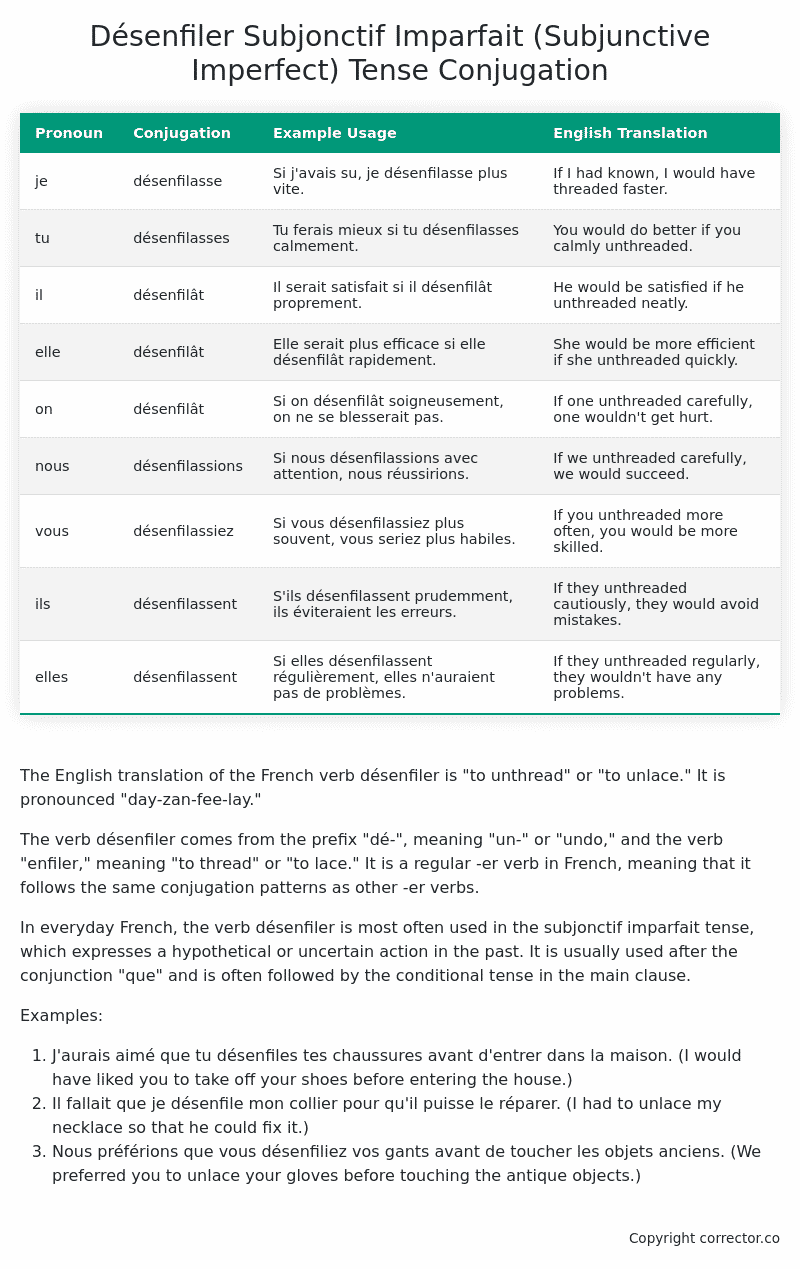Subjonctif Imparfait (Subjunctive Imperfect) Tense Conjugation of the French Verb désenfiler
Introduction to the verb désenfiler
The English translation of the French verb désenfiler is “to unthread” or “to unlace.” It is pronounced “day-zan-fee-lay.”
The verb désenfiler comes from the prefix “dé-“, meaning “un-” or “undo,” and the verb “enfiler,” meaning “to thread” or “to lace.” It is a regular -er verb in French, meaning that it follows the same conjugation patterns as other -er verbs.
In everyday French, the verb désenfiler is most often used in the subjonctif imparfait tense, which expresses a hypothetical or uncertain action in the past. It is usually used after the conjunction “que” and is often followed by the conditional tense in the main clause.
Examples:
- J’aurais aimé que tu désenfiles tes chaussures avant d’entrer dans la maison. (I would have liked you to take off your shoes before entering the house.)
- Il fallait que je désenfile mon collier pour qu’il puisse le réparer. (I had to unlace my necklace so that he could fix it.)
- Nous préférions que vous désenfiliez vos gants avant de toucher les objets anciens. (We preferred you to unlace your gloves before touching the antique objects.)
Table of the Subjonctif Imparfait (Subjunctive Imperfect) Tense Conjugation of désenfiler
| Pronoun | Conjugation | Example Usage | English Translation |
|---|---|---|---|
| je | désenfilasse | Si j’avais su, je désenfilasse plus vite. | If I had known, I would have threaded faster. |
| tu | désenfilasses | Tu ferais mieux si tu désenfilasses calmement. | You would do better if you calmly unthreaded. |
| il | désenfilât | Il serait satisfait si il désenfilât proprement. | He would be satisfied if he unthreaded neatly. |
| elle | désenfilât | Elle serait plus efficace si elle désenfilât rapidement. | She would be more efficient if she unthreaded quickly. |
| on | désenfilât | Si on désenfilât soigneusement, on ne se blesserait pas. | If one unthreaded carefully, one wouldn’t get hurt. |
| nous | désenfilassions | Si nous désenfilassions avec attention, nous réussirions. | If we unthreaded carefully, we would succeed. |
| vous | désenfilassiez | Si vous désenfilassiez plus souvent, vous seriez plus habiles. | If you unthreaded more often, you would be more skilled. |
| ils | désenfilassent | S’ils désenfilassent prudemment, ils éviteraient les erreurs. | If they unthreaded cautiously, they would avoid mistakes. |
| elles | désenfilassent | Si elles désenfilassent régulièrement, elles n’auraient pas de problèmes. | If they unthreaded regularly, they wouldn’t have any problems. |
Other Conjugations for Désenfiler.
Le Present (Present Tense) Conjugation of the French Verb désenfiler
Imparfait (Imperfect) Tense Conjugation of the French Verb désenfiler
Passé Simple (Simple Past) Tense Conjugation of the French Verb désenfiler
Passé Composé (Present Perfect) Tense Conjugation of the French Verb désenfiler
Futur Simple (Simple Future) Tense Conjugation of the French Verb désenfiler
Futur Proche (Near Future) Tense Conjugation of the French Verb désenfiler
Plus-que-parfait (Pluperfect) Tense Conjugation of the French Verb désenfiler
Passé Antérieur (Past Anterior) Tense Conjugation of the French Verb désenfiler
Futur Antérieur (Future Anterior) Tense Conjugation of the French Verb désenfiler
Subjonctif Présent (Subjunctive Present) Tense Conjugation of the French Verb désenfiler
Subjonctif Passé (Subjunctive Past) Tense Conjugation of the French Verb désenfiler
Subjonctif Imparfait (Subjunctive Imperfect) Tense Conjugation of the French Verb désenfiler (this article)
Subjonctif Plus-que-parfait (Subjunctive Pluperfect) Tense Conjugation of the French Verb désenfiler
Conditionnel Présent (Conditional Present) Tense Conjugation of the French Verb désenfiler
Conditionnel Passé (Conditional Past) Tense Conjugation of the French Verb désenfiler
L’impératif Présent (Imperative Present) Tense Conjugation of the French Verb désenfiler
L’infinitif Présent (Infinitive Present) Tense Conjugation of the French Verb désenfiler
Struggling with French verbs or the language in general? Why not use our free French Grammar Checker – no registration required!
Get a FREE Download Study Sheet of this Conjugation 🔥
Simply right click the image below, click “save image” and get your free reference for the désenfiler Subjonctif Imparfait tense conjugation!

Désenfiler – About the French Subjonctif Imparfait (Subjunctive Imperfect) Tense
Formation
Common Everyday Usage Patterns
Interactions with Other Tenses
Subjonctif Présent
Indicatif Passé Composé
Conditional
Conditional Perfect
Summary
I hope you enjoyed this article on the verb désenfiler. Still in a learning mood? Check out another TOTALLY random French verb conjugation!


